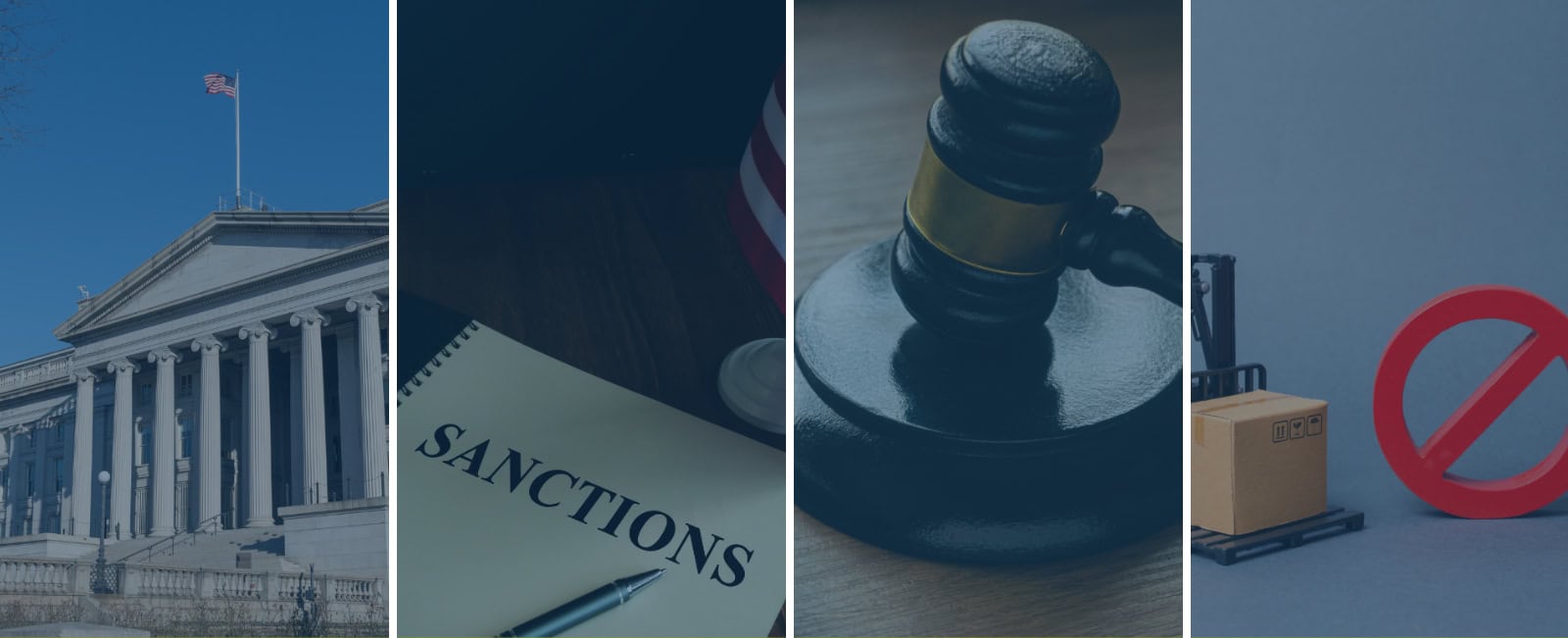COVID-19 RELIEF IMPORTS WEB PORTAL
Due to the high volume of inquiries received in the COVID-19 Relief Imports email inbox, CBP is migrating to the COVID-19 Relief Imports Web Portal. The web portal has been established to replace the email address for all cargo inquiries related to the importation of medical supplies to fight the spread of the COVID-19 virus. It provides an interactive experience for the user to review pertinent information and allows for the submission of a direct inquiry to the COVID-19 Cargo Resolution Team (CCRT). The web portal can be found at https://imports.cbp.gov/.
OFAC “FACT SHEET” ON HUMANITARIAN ASSISTANCE AND TRADE (COVID-19)
The sanctions programs administered by the U.S. Department of the Treasury’s Office of Foreign Assets Control (OFAC) generally allow for legitimate humanitarian-related trade, assistance, or activity under existing laws and regulations. OFAC encourages those interested in providing such assistance during the COVID-19 crisis to avail themselves of longstanding exemptions, exceptions, and authorizations pertaining to humanitarian assistance and trade available in many U.S. sanctions programs.
This Fact Sheet provides consolidated guidance highlighting the most relevant exemptions,
exceptions, and authorizations for humanitarian assistance and trade under the OFAC administered Iran, Venezuela, North Korea, Syria, Cuba, and Ukraine/Russia-related sanctions programs.
Iran: The United States maintains broad exemptions, exceptions, and authorizations that allow for the provision of humanitarian assistance and the commercial sale and export of agricultural commodities, food, medicine, and medical devices, to Iran from the United States or by U.S. persons or U.S.-owned or -controlled foreign entities. For COVID-19 related support, Treasury continues to stress that U.S. and non-U.S. persons may provide such humanitarian goods — including medicine and medical devices — to Iran under existing exemptions, exceptions, and authorizations in U.S. sanctions laws and regulations.
Venezuela: U.S. persons are not prohibited from engaging in transactions involving the country or people of Venezuela, provided that the Government of Venezuela, other blocked persons, or proscribed conduct are not involved. To ensure that humanitarian goods can reach the people of Venezuela despite a nexus to the Government of Venezuela, the United States maintains broad exemptions and authorizations that allow for the provision of humanitarian assistance and the commercial sale and export of agricultural commodities, food, medicine, and medical devices, to Venezuela.
North Korea: OFAC generally licenses nongovernmental organizations (NGO) to provide services related to certain humanitarian activities. Such support may include providing items to the civilians of North Korea, to include but not limited to testing kits, respiratory devices, personal protective equipment, and medicine used in the prevention, diagnosis, treatment, and recovery from COVID-19. OFAC authorizes limited transactions involving the Government of North Korea, including payment of reasonable fees, taxes and import duties, and purchase of permits, licenses, and bills related to public utility consumption. Partnerships, agreements, and most other working relationships between NGOs and the Government of North Korea that are necessary for the NGO to provide services to vulnerable populations located in North Korea are prohibited without a specific license.
Syria: OFAC remains committed to ensuring that syria sanctions do not limit the ability of civilians located in Syria to receive humanitarian support from the international community. Such support may include providing items to the civilians of Syria, to include testing kits, respiratory devices, personal protective equipment, and medicine used in the prevention, diagnosis, treatment, and recovery from COVID-19. The United States government aims to work closely with the international organizations and humanitarian assistance community to address any obstacles.
Cuba: Cuba embargo targets Cuba’s Communist regime, which has for decades oppressed the Cuban people and failed to meet their most basic needs. Though the Cuba embargo remains in place, and most transactions between the United States, or persons subject to U.S. jurisdiction, and Cuba continue to be prohibited, OFAC maintains several general license authorizations designed to allow for humanitarian relief and assistance to the Cuban people
RELIEF RELATING TO DEPOSITS OF ESTIMATED CUSTOMS DUTIES, TAXES, FEES (COVID-19)
CBP and Treasury jointly released for publication in the Federal Register a temporary final rule that temporarily extends—for 90 days—deadlines for remitting certain estimated customs duties, taxes, and fees as relief measures in response to the coronavirus (COVID-19) pandemic.
The measures temporarily postpone the deadline for importers of record with a significant financial hardship to deposit certain estimated duties, taxes, and fees that they would ordinarily be obligated to pay as of the date of entry (or the date of “withdrawal from warehouse”) for merchandise entered in March or April 2020. The extension is for a period of 90 days from the date that the deposit would otherwise have been due.
This temporary postponement does not permit the return of any deposits of estimated duties, taxes, and/or fees that have been paid. This temporary postponement also does not apply to entries, or withdrawals from warehouse, subject to certain “specified trade remedies” and any entry summary that includes merchandise subject to those trade remedies is not eligible under this rule.
To qualify for this temporary postponement, an importer must demonstrate a “significant financial hardship.” An eligible importer’s operation must be fully or partially suspended during March or April 2020 due to orders from a competent governmental authority limiting commerce, travel or group meetings because of COVID-19. An eligible importer does not need to file additional documentation with CBP to be eligible for this relief, but must maintain documentation as part of its books and records establishing that it meets the requirements for relief.
This temporary postponement does not apply to deadlines for the payment of other debts to CBP—such as deadlines for the payment of bills for duties, taxes, fees, and interest determined to be due upon liquidation or reliquidation; deadlines for the payment of fees authorized pursuant to 19 U.S.C. 58c (except for merchandise processing fees and dutiable mail fees); or deadlines for the payment of any penalty or liquidated damages due to CBP.
The effective date of this temporary final rule is April 20, 2020. The due date for comments is May 20, 2020.
RULES CONCERNING CCL AND MILITARY END-USE EXPORTS
A final rule to amend the Export Administration Regulations (EAR) by removing license exception civil end-users (CIV) and requiring a license for national security-controlled items on the Commerce Control List (CCL) to countries of national security concern and to make conforming changes to the CCL by removing the CIV paragraph from each Export Control Classification Number on the CCL where it appears.
A final rule to amend the EAR to expand license requirements on exports, reexports, and transfers (in-country) of items intended for military end-use or military end-users in China, Russia or Venezuela. The final rule expands the licensing requirements for China to include “military end-users,” in addition to “military end-use;” it broadens the list of items for which the licensing requirements and review policy apply and expands the definition of “military end-use;” it creates a new reason for control and the associated review policy for regional stability for certain items exported to China, Russia or Venezuela; and it adds Electronic Export Information filing requirements in the Automated Export System for exports to China, Russia, and Venezuela.
A proposed rule to amend the EAR by modifying License Exception Additional Permissive Reexports (APR). Specifically, BIS is proposing to remove provisions that authorize reexports of certain national security-controlled items on the CCL to gain better visibility into transactions of national security or foreign policy interest to the United States.
TRADE AGREEMENT BETWEEN CANADA, MEXICO, UNITED STATES ENTERS INTO FORCE JULY 1, 2020
Trade Representative notified Congress that Canada and Mexico have taken measures necessary to comply with their commitments under the United States–Mexico–Canada Agreement (USMCA), and that the Agreement will enter into force on July 1, 2020. Following that notification to Congress, the United States became the third country to notify the other Parties that it had completed its domestic procedures to implement the agreement—the final step necessary for the USMCA to enter into force.
The Agreement contains significant improvements and modernized approaches to rules of origin, agricultural market access, intellectual property, digital trade, financial services, labor, and numerous other sectors. These enhancements will deliver more jobs, provide stronger labor protections, and expand market access, creating new opportunities for American workers, farmers, and ranchers.
CHANGES TO ITAR REQUIREMENTS FOR RENEWALS, REMOTE WORKERS (COVID-19)
State Department notification provides a temporary suspension, modification, and exception regarding:
The requirement to renew registration as a manufacturer, exporter, and/or broker and pay a fee on an annual basis by extending ITAR registrations with an expiration date of February 29, March 31, April 30, May 31, or June 30, 2020 (for two months from the original date of expiration)
The limitations on the duration of ITAR licenses and agreements, to extend any license or agreement that expires between March 13, 2020, and May 31, 2020, for six months from the original date of expiration as long as there is no change to the scope or value of the authorization and no name/address changes are required
The requirement that a “regular employee” work at the company’s facilities, so as to allow individuals to work at a remote work location
Authority for regular employees of licensed entities who are working remotely in a country not currently authorized by a technical assistance agreement, manufacturing license agreement, or exemption to send, receive, or access any technical data authorized for export, reexport, or retransfer to their employer via a technical assistance agreement, manufacturing license agreement, or exemption
U.S. DDTC REDUCES REGISTRATION FEES (COVID-19)
DDTC is temporarily reducing registration fees for DDTC registrants in Tier I and Tier II to $500 for registrations whose original expiration date is between May 31, 2020 and April 30, 2021. Also, DDTC is reducing registration fees to $500 for new applicants who submit their registration application between May 1, 2020 and April 30, 2021. All new registrants are in Tier I in the first year. This will allow new registrants and existing registrants in Tiers I and II, many of which are small and medium-sized enterprises, to receive a reduced registration fee over the course of the coming year. The fee structure for Tier III entities remains unchanged at this time. We anticipate that this temporary reduction in fees for Tier I, Tier II, and new registrants will save regulated industry over $20 million over the course of the coming year.
This temporary reduction in fees shall apply only through April 30, 2021, at which time fees for entities in Tiers I and II will return to the rates that were in effect on April 1, 2020 unless otherwise extended by a subsequent notice in the Federal Register.


